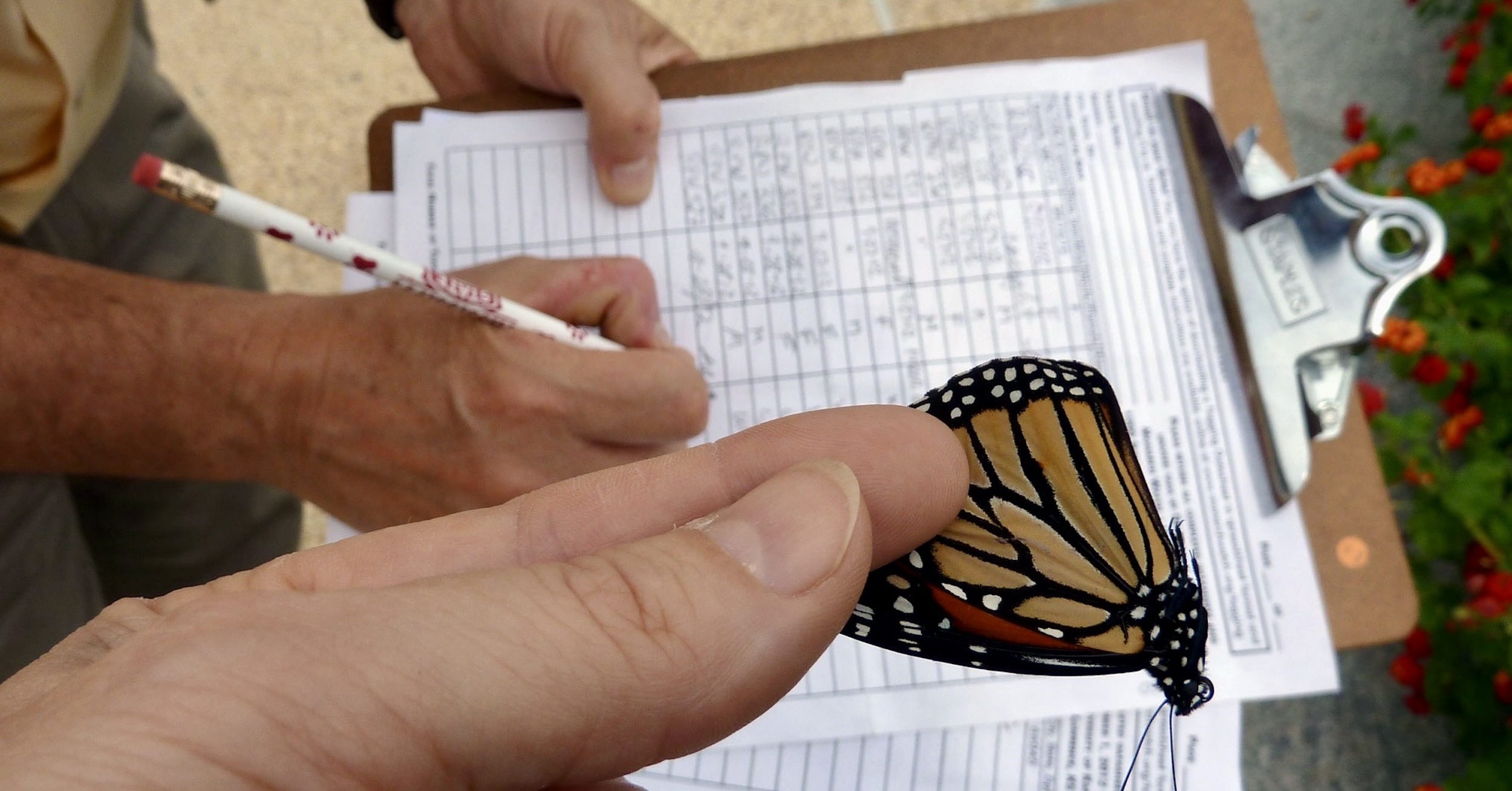
« Monarch butterfly, Danaus plexippus, tagged in Freer Gallery Garden, National Mall, Washington, DC, USA. 28 September 2012. » (📸 Katja Schulz via Wikimedia under CC BY 2.0, cropped)
Bluesky Blue Check Blues
So far, so much has been accomplished with so little, but this time I believe Jay and the Bluesky team have it wrong.
By Terence C. Gannon
Iwould trust a Bluesky user @sjobs.bsky.apple.com long before I would ever trust @sjobs.bsky.social The reason is simple: the former is based on Bluesky’s existing elegant ‘domain’ verification system, whereas the latter is based on the new ‘blue check’ verification system launched a few days ago.
The reason is simple: the former is based on Bluesky’s existing elegant ‘domain’ verification system, whereas the latter is based on the new ‘blue check’ verification system launched a few days ago.
On the Shoulders of Giants
Bluesky allows its users to employ an internet domain name for their handle as opposed to the standard handle the platform doles out by default. There’s a catch, though: administrative rights to the domain in question will be required, which only makes sense, of course.
Continuing with the Apple example, I have absolutely no knowledge of how they administer their apple.com domain. However, they undoubtedly have a whole team of people ensuring it’s properly employed. Setting up @sjobs.bsky.apple.com would require the specific, active co-operation of these security experts. Therefore, if and when I ever see this currently fictitious handle on Bluesky, I’ll have no choice but to believe the geniuses at Apple have somehow managed to bring a presumably AI-powered Steve back to life, hopefully posting about “one more thing”.
Moreover, the setup I have just described can happen today. No further development work is required, and nothing new to invent.1 Better yet, whatever minimal administrative burden there is will be borne by the user. In addition — and this is important — the burden would not be borne by Bluesky. Good thing. The dedicated and tireless handful of Bluesky employees who have been working on the platform already have their hands more than full.
Happily, domain verification scales down nicely as well. Custom domain names officially won the race to the bottom years ago. An individual can still pick up one for a mere pittance.
The Domain Naming System (DNS) on which all of this is predicated was introduced in 1983 — forty-two years ago — and while I imagine its reputation is not entirely unsullied, it has been working pretty well all that time. It’s also safe to say that a future, massive failure of DNS likely means modern society has much bigger fish to fry than not being able to post pictures of their remarkable culinary creations or their cat’s latest antics.
To Have and Have Not
There was a twinge of jealousy when I spotted the first Bluesky blue check mark in the wild. My instinctive reaction was “so where do I sign up for one of these?” Then, when I read in the official announcement which included « Bluesky will proactively verify authentic and notable accounts and display a blue check next to their names », my reaction quickly pivoted to “so … it’s going to be like that, is it?”
In other words, those who already have the playing field tilted in their favour are rewarded with a bit more tilting. Meanwhile, those of us way down here on The Long Tail2 — flying in formation with the X-axis, destination Asymptotia — are left to ponder what it is we have to do to be more « authentic and notable ».
This was my primary objection to blue check verification, initially. It stratifies the entire Bluesky community into two asymmetrical groups: a small minority who have a blue check mark and a vast majority wondering how they’re eventually going to get one.
One of the initial attractions of Bluesky was the likely fallacious idea that we were all starting all over again. Good content, carefully crafted by human hands, would unambiguously win the day. Instead, Bluesky’s efforts now seem biased towards efforts which steadily push us all in the direction of having a great many listening to a precious few for reasons which are not entirely clear. Where have we all seen this movie before?
Nest of Vipers
To their credit, Bluesky has no illusions about being able to keep up with the incipient high demand for blue check marks. Right there in the launch material is the statement « trust doesn’t come only from the top down; it emerges from relationships, communities, and shared context. So, we’re also enabling trusted verifiers: organizations that can directly issue blue checks. » This sounds good, in theory, but it really just proxifies the supply-demand imbalance problem. Bluesky is still going to have to take time and energy — and the heat — from who they determine should be « trusted ».
Examples of the first organisations to meet this bar are WIRED and the New York Times. I have no problem with either of these, but it doesn’t take the proverbial rocket surgeon to see a pattern in what is admittedly too small a sample to make any definitive judgments. But based on these two, it definitely seems like Bluesky is earning the blue in its name.
What will happen when the National Review wants the same treatment? What about Fox News or Newsmax or Breitbart? What argument can and will be made for any of these being included or excluded in the « trusted » list? If this seems ‘complicated’ what about a government,3 the values of which Bluesky — or simply society writ large — finds questionable? Will Bluesky bestow « trusted » on it?
If I learned anything from the excellent 2025 documentary Breaking the Bird4 it was once having sleepwalked into this vipers-nest-embedded-in-a-quagmire, there’s really no emerging from it. It’s a battle Bluesky is all but preordained to lose and only after it has come at great cost. A Pyrrhic defeat, to coin a phrase.
Life is Beautiful
In the last few years, there has been a lot of discussion about ‘free speech’ as it relates to social platforms. It was years ago5 I first wrote about free speech without accountability isn’t free speech at all — it’s just angry noise. Or worse. I'm shocked anybody, particularly those who ought to know better, is still confused about this.
Take away the cloak of anonymity and you’ll actually have a town square where things can be discussed in a fairly constructive manner by the overwhelming majority who are reasonable. Or at least have the good sense to keep their crazier ideas to themselves, lest they be seen by their friends and neighbours to be — y'know — idiots. Or worse.
Which is really a much better argument for Bluesky just sticking with the domain verification system with which it started. While it’s imperfect, without a doubt, DNS does create a tenuous, pullable thread of accountability between what is being said on the platform and specifically who is saying it. Aided by the ingrained, aggressive agnosticism of DNS, Bluesky will be able to do so with essentially zero burden on its resources at any level.
With all this suddenly freed up ‘free time’ they will have a result, perhaps Bluesky can finally deliver the five minute edit window which I would use every day to save me from my silly typos.
©2025 Terence C. Gannon
***
Have any thoughts on the subjects on which I have touched above? I would love to hear from you. Please leave your thoughts, where else, as a reply to this post on Bluesky. ~ TCG
 The reason is simple: the former is based on Bluesky’s existing elegant ‘domain’ verification system, whereas the latter is based on the new ‘blue check’ verification system launched a few days ago.
The reason is simple: the former is based on Bluesky’s existing elegant ‘domain’ verification system, whereas the latter is based on the new ‘blue check’ verification system launched a few days ago.